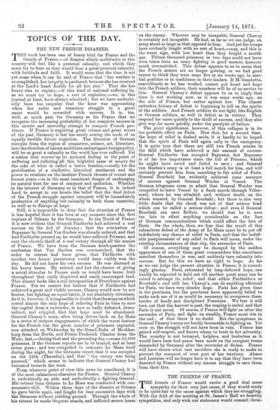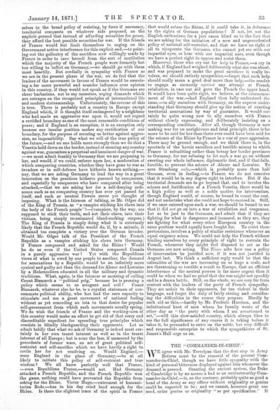THE FRIENDS OF FRANCE.
THE friends of France would excite a good deal more sympathy for their very just cause, if they Would study to be quite fair to the cause against which they are struggling. With the drift of the meeting at St. James's Hall we heartily sympathize, and only wish our statesmen would commit them-
selves to the broad policy of resisting, by force if necessary, territorial conquests on whatever side proposed, on the explicit ground that instead of affording securities for peace, they afford the best possible securities for war. If the friends of France would but limit themselves to urging on the Government active interference for this explicit end,—to point- ing out the gallantry of the sacrifices now willingly made by France in order to save herself from the sort of mutilation which the majority of the French people were formerly but too willing to inflict on Germany,—we should go with them most heartily. But cordially in sympathy with France as we are in the present phase of the war, we do feel that the leaders of the movement in favour of France would be exercis- ing a far more powerful and sounder influence over opinion in this country, if they would not speak as if the Germans are sheer barbarians, not to say monsters, urging demands which are outrages on the recognized principles of international life and modern statesmanship. Unfortunately, the reverse of this is true. There is probably not a country in Europe except England which, if it thought itself endangered by a neighbour who had made an aggressive war upon it, would not regard a rectified boundary as one of the most reasonable conditions of peace; and if England is an exception, it is an exception only because our insular position makes any rectification of our boundary, for the purpose of securing us better against aggres- sion, an impossibility. Say what we will of the true policy of the future,—and no one holds more strongly than we do that a Venetia held down on the border, instead of securing any country against war, guarantees a perpetual and imminent danger of war, —we must admit frankly to Germany that we are proposing to her, and would, if we could, enforce upon her, a moderation of which conquering countries, whether they have gone to war as invaders or in self-defence have hitherto known nothing,— nay, that we are asking Germany to lead the way in a great innovation on the practices hitherto pursued by conquerors, and especially by conquerors who have conquered after being attacked,—that we are asking her for a self-denying ordi- nance such as no conquering country has ever yet passed for itself, and such as neutral Powers never yet thought of imposing. What is the fairness of talking, as Mr. Odger did of the King of Prussia, as " a vampire sticking his claws into the body of the French people"?—(vampires, by the way, are supposed to stick their teeth, and not their claws, into their victims, being simply re-animated blood-sucking corpses.) The King of Prussia is simply doing what it is extremely likely that the French Republic would do, if, by a miracle, it obtained too complete a victory over the German invader. Would Mr. Odger talk of the President of the French Republic as a vampire sticking his claws into Germany, if France conquered and asked for the Rhine ? Would he do so even if the United States conquered Canada in a purely aggressive war ? Yet with the Republican views of what is owed by one people to another, the demand for annexations by a Republic would be an infinitely more cynical and guilty act than the demand for Alsace and Lorraine by a Hohenzollern educated in all the military and dynastic traditions. What, again, is the fairness or meaning of calling Count Bismarck a " political prig," because he is pressing a policy which seems to us arrogant and evil ? Count Bismarck, whatever else he be, is a royalist statesman of con- summate political ability, who has had the rare capacity to stimulate and use a great movement of national feeling without as yet conceding an iota to that desire for popular self-government from which such movements usually spring. We do wish the friends of France and the working-men of this country would make an effort to get rid of that sorry and discreditable expedient for spreading true principles which consists in blindly blackguarding their opponents. Let us admit boldly that what we ask of Germany is indeed most cer- tainly in her own truest interest as well as in the truest interest of all Europe ; but is none the less, if measured by the precedents of former wars, an act of great political self- restraint and self-sacrifice which we have hardly a right to revile her for not resolving on. Would England,— were England in the place of Germany,—be at all likely to initiate this policy of self-restraint and true wisdom We all know perfectly well that France, —even Republican France,—would not. Had Germany attacked a French Republic, and the French Republic won the game, nothing could have prevented the Republic from asking for the Rhine. Victor Hugo,—extremest of humani- tarian Reds,—has in his day cried loud enough for the Rhine. Is there the slightest trace of the spirit in France that would refuse the Rhine, if it could take it, in deference to the rights of German populations ? If not, let not the English enthusiasm for a just cause blind us to the fact that we are asking for the initiation of a new and unprecedented policy of national self-restraint, and that we have no right at all to vituperate the Germans, who cannot yet see with our impartial eyes, or hear with our impartial ears, even though we have a perfect right to oppose and resist them.
Moreover, those who cry out for help to France,—a cry in which, if England had weighed deliberately what she was about, and was prepared to make the great sacrifices it really in- volves, we should entirely sympathize,—forget that such help should really mean a good deal more than help,—the resolve to engage as earnestly against any attempt at French retaliation, in case our aid gave the French the upper hand. It would have been quite right, we believe, at the commence- ment of the war,—had England then fully understood the issue,—to ally ourselves with Germany, on the express under- standing that Germany should give up the notion of exacting territorial annexations by way of guarantee. It would cer- tainly be quite wrong now to ally ourselves with France without clearly expressing, and deliberately insisting on a corresponding condition. After all, though Germany is now making war for an unrighteous and fatal principle, there is far more to be said for her than there ever could have been said for the seizure of the Rhine by France in a war of pure aggression. There may be ground enough, and we think there is, in the spectacle of the heroic sacrifices and terrible misery to which France is submitting rather than betray her border provinces to Germany, for our refusing to let such a war go on without exerting our whole influence, diplomatic first, and if that fails, forcible, to prevent the seizure of Alsace and Lorraine. To save Strasburg only,—which is probably more than half German, even in feeling,—to France, we do not conceive that it would be in any degree right to interfere. But if the territorial demands are to go beyond that, and to involve the seizure and fortification of a French Venetia, there would be a high policy as well as a noble motive for intervention, though England would, of course, be bound to count the cost, and not undertake what she could not hope to succeed in. Still, if we once entered upon such a war, we should be bound to see that it did not go on into a war of retaliation and vengeance. Let us be just to the Germans, and admit that if they are fighting for what is dangerous and immoral, as they are, they are fighting for what every other European country in the same position would equally have fought for. To resist these pretensions, involves a policy of similar resistance whenever an equal exigency arises. We could not help the French without binding ourselves by every principle of right to restrain the French, whenever they might feel disposed to act as the Germans are now acting. The Times asks how can a policy of intervention be justified now, if it was not justified in August last. We think a sufficient reply would be that the calamities of the war are increasing on so huge a scale, and are threatening so terrible a result to Europe, that an efficient interference of the neutral powers is far more urgent than it could be when we had no proof that the war might not speedily end in a drawn battle. Still, on the whole, we are very far from
content with the leaders of the party of French sympathy. They are unfair to their opponents, far too violent in their language, and forget the duty of fairly stating and consider- ing the difficulties in the course they propose. Hardly by such aid as this,—hardly by Mr. Frederic Harrison, and the infinitesimal knot of men whom he funnily wrote of the other day as " the party with whom I am accustomed to act,"—will this slow-minded country, which always likes to see the full significance of any course it is taking before it takes it, be persuaded to enter on the noble, but very difficult and responsible enterprise to which the sympathizers of St. James's Hall urge us on.



































 Previous page
Previous page